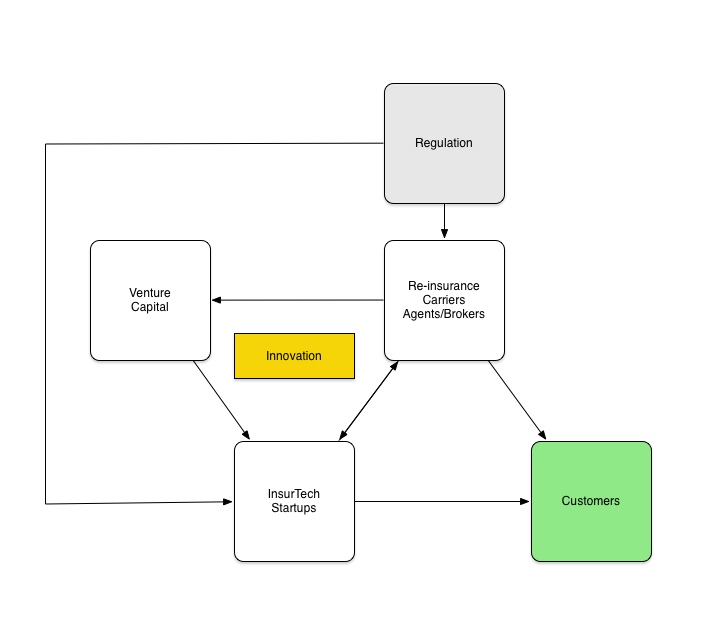Nick Lamparelli joined Gilad and the InsurTechLA community for an unscripted InsurTechTalk. In this broadcasted event, Nick was in the interviewee's seat. We had the opportunity to learn about Nick’s day job and dive into flood insurance and how to build insurance programs.
Bold Penguin, InsNerds at InsurTech LA
The idea was to bring Ryan Hanley, CMO of Bold Penguin (at that time), to talk about Bold Penguin, Marketing and Commercial insurance. Ryan is a source of endless energy (check out his site https://ryanhanley.com/) that I wanted to introduce to the local scene.
Bold Penguin caters to agents and broker by providing them leads reselling their surplus leads. So, I asked Nick Lamparelli from InsNerds and Profile and Risk podcast to join the party.
Thank you for ORACLE for hosting InsurTechLA event at their Santa Monica offices.
Insight on Innovation: from legacy company and startup
Innovation in insurance is not limited to a new shiny technology. New products, new insurance products, can be and are innovative in many ways, and they require people, processes, and a mindset to make them happen.
Mariel Devesa, head of global business development for Phyn and former head of innovation for Farmers Insurance, shared her experience and insights on innovation. Stephen Goldstein joined Mariel to facilitate the fireside talk and to ask the hard questions.
There is a misconception that insurance companies don't innovate.
Carriers don't have a shortage of ideas, but they need to start somewhere. One of the ways to prioritize is by asking where is the most substantial impact.
"The shiny disco ball syndrome" is when someone says "we need to do this" and then four weeks later "oh, we need to do that," and later "we need to focus over Continually shifting focus on whatever is in fashion or is getting the most publicity at the moment."
Building trust
"I remember that at the beginning of my work with Gus Fuldner, VP of safety and insurance at Uber, it was all about building trust." Both sides had reservations and concerns, however, trust was built, and it resulted in drafting the “compromise language,” [1] which created a framework for states to pass and provided clarity to build an insurance offering.
2018 Predictions
2017 has been an interesting year for InsurTech. I would define it as the year that InsurTech took another step from adolescence towards adulthood. I define "adolescence" as the time that the youth exhibits exploration, rebellious and self-definition behavior. The players in the industry are still figuring out the rules of the game, they are defining the frameworks and the majority do not know what to do with it all.
My dear friends Shefi and Avi from Coverager gathered the following information on investors and investment in the global insurance industry. For additional information and segmentation by continents. Checkout Shefi's article.
The investments' volume is stabilizing similar to the trend that we witnessed in FinTech (a CBInsight graph should be here.) An interesting fact is the amounts that the investors put into the more established companies such as Lemonade and DataRobot and the brand new startups. Why is it interesting? Very simple, SoftBank invested $120M series C in Lemonade and New Enterprise Associates invested $67M series C in DataRobot. Both investors understand the cost of doing business in the insurance industry and each investor has an investment strategy. Take a look at SoftBank's portfolio here. Lemonade needs the capital in order to grow as an insurance carrier to new territory leveraging its scalable core system, and DataRobot needs to expand its enterprise sales force.
The insurance companies and the reinsurance companies took several steps forward as well to embrace the change and opportunity that the newcomers bring. One indicator was the number of participants at Jay Weintraub's ITC2017 conference. 3,800 attended the conference, double the number of the ITC2016 conference. Another indicator is the increasing number of venture arms. In 2015, the European insurers had the lead with AXA, Allianz, and Aviva who created a venture arm and XL Catlin as the only US-based insurer with a venture arm. In 2016, additional US insurers founded their venture arm Nationwide $100M, Liberty Mutual $150M and Intact (Canada) $200. In 2017, Northwestern Mutual launched its venture arm and many others got the spotlight, for example, RGAx, Aflac ventures, and BlueCross ventures. Others increased the size, scope, and talent of their innovation team e.g. AIG.
The 2017 buzzwords and trends
We can't ignore the buzz words and trends that shaped 2017 tech world. I think that we can all agree that AI, blockchain, bitcoin, ICO, and bots were the 2017-Q3 Q4 buzzwords that eclipsed the Q1-Q2 buzzwords predictive analytics, big data, and customer engagement. Bear in mind that in many insurance companies the phrases "digital transformation", "agile", "mobile first" etc are work in progress and the mid-size agencies, who are a major player in the distribution channel, are not digitized as they should.
Not everything is Distribution or new insurance products. The SaaS, the DaaS and the smart compare engines that have done well. We can't go without mentioning CrapeData, DataRobot, PolicyGenius, and BoldPenguin.
2018 Predictions
1. CYBER INSURANCE
There are new and exciting hardcore technologies coming out from innovation centers and from the Cyber powerhouse Israel. The space is not defined enough for an underwriting, pricing and the standards that can provide significant recovery through the claims process. In 2018, we are going to see new insurance products that can address the combined risk of system and human. We are at the start of cyber insurance.
2. THE FALL OF BLOCKCHAIN
No, blockchain will not fall -- the excitement will wind down. The engine that drives the research and searches for revenue-driving applications will continue. We going to witness additional institutes (research and consortium) that will help the carriers to improve on internal processes.
3. SMART CITIES
In 2018 we are going to the chatter around Smart Cities. Why? Because Singapore, Dubai, Amsterdam, Barcelona and other cities are exploring the concept.
A smart city is an urban area that uses different types of electronic data collection sensors to supply information which is used to manage assets and resources efficiently. --Wikipedia
Insurance will benefit from smart cities in the future. Safer urban areas, better risk management, and easier CAT assessments. In the meanwhile, it is important to observe the IoT operation that will power the Smart City and the cyber security + cyber insurance that it may require.
4. ARE BOTS STILL A THING?
No, unless you don't have one.
5. API
Application Programming Interface (API) is THE 2018 prediction for me. Carriers know that the marginal cost of adding another "digital agent" can cost them millions if they don't have a modern API management system. Insurance companies want to work and receive business from the new InsurTech startups who registered as agents in all 50 states and with the agents who digitized their own business.
6. Agents
The core entrepreneurs of the insurance industry. The agents will have two paths to take (i) evolve to an InsurTech agency (ii) buy InsurTech services to make their agency more productive and more efficient. In 2018, the agents will be the buying force of InsurTech products.
7. Venture Life Cycle
In 2018, InsurTech startups are going to enter new stages of a venture's life cycle. Scale - startups are going to invest their series A and B and scale their operation, customer base and revenue. Acquisition - for market segment, technology and talent. Dissolve - because they had the wrong product, the wrong team, the wrong business model, or that their competitors were better.
Geospatial Insights - LA InsurTech Talk
Thomas (Tommy) Ashman, co-founder of Slingshot Aerospace, joined me for a fireside chat on Geospatial Insights and the insurance.
The audience enjoyed learning about Tommy's background and personal journey into entrepreneurship. Starting from his air force service to meeting his co-founder, Melanie.
Another journey that we talked about was the journey of building the company and the product. Many startups start in one direction and then pivot the product to find a market fit. Slingshot started with a mission to help vineyard owners to produce better wine. A mission that resonates with many readers.
Slingshot was part of the TechStars LA inaugural class. We touched lightly on the fundraising effort and didn't go into details because at the time of the chat they were close to close a large seed.









